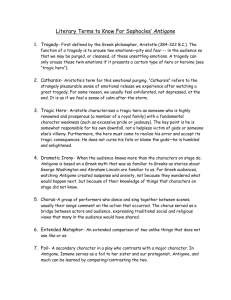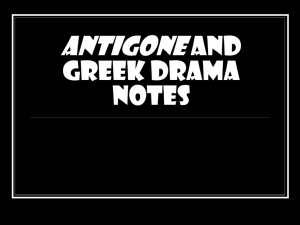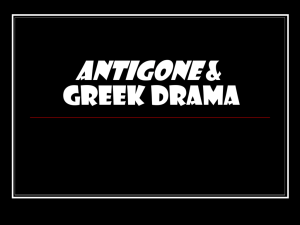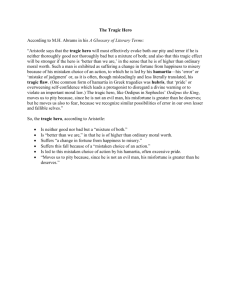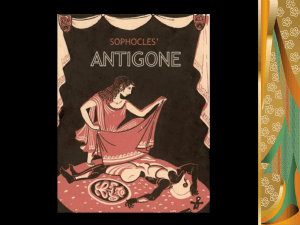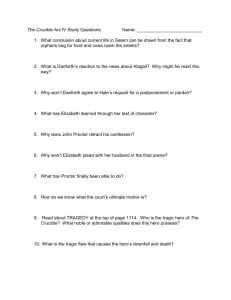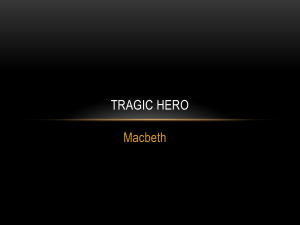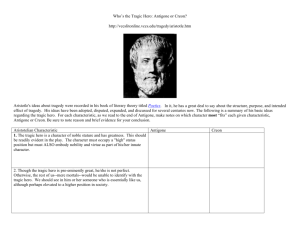Introduction to Drama Key
advertisement
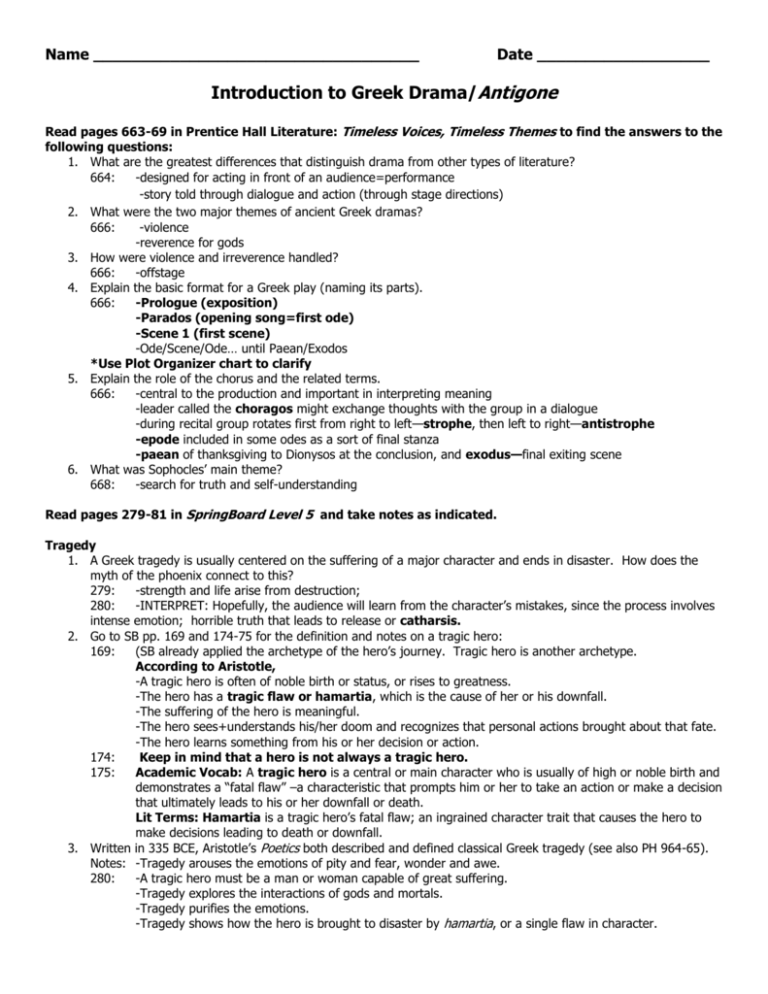
Name __________________________________ Date __________________ Introduction to Greek Drama/Antigone Read pages 663-69 in Prentice Hall Literature: Timeless Voices, Timeless Themes to find the answers to the following questions: 1. What are the greatest differences that distinguish drama from other types of literature? 664: -designed for acting in front of an audience=performance -story told through dialogue and action (through stage directions) 2. What were the two major themes of ancient Greek dramas? 666: -violence -reverence for gods 3. How were violence and irreverence handled? 666: -offstage 4. Explain the basic format for a Greek play (naming its parts). 666: -Prologue (exposition) -Parados (opening song=first ode) -Scene 1 (first scene) -Ode/Scene/Ode… until Paean/Exodos *Use Plot Organizer chart to clarify 5. Explain the role of the chorus and the related terms. 666: -central to the production and important in interpreting meaning -leader called the choragos might exchange thoughts with the group in a dialogue -during recital group rotates first from right to left—strophe, then left to right—antistrophe -epode included in some odes as a sort of final stanza -paean of thanksgiving to Dionysos at the conclusion, and exodus—final exiting scene 6. What was Sophocles’ main theme? 668: -search for truth and self-understanding Read pages 279-81 in SpringBoard Level 5 and take notes as indicated. Tragedy 1. A Greek tragedy is usually centered on the suffering of a major character and ends in disaster. How does the myth of the phoenix connect to this? 279: -strength and life arise from destruction; 280: -INTERPRET: Hopefully, the audience will learn from the character’s mistakes, since the process involves intense emotion; horrible truth that leads to release or catharsis. 2. Go to SB pp. 169 and 174-75 for the definition and notes on a tragic hero: 169: (SB already applied the archetype of the hero’s journey. Tragic hero is another archetype. According to Aristotle, -A tragic hero is often of noble birth or status, or rises to greatness. -The hero has a tragic flaw or hamartia, which is the cause of her or his downfall. -The suffering of the hero is meaningful. -The hero sees+understands his/her doom and recognizes that personal actions brought about that fate. -The hero learns something from his or her decision or action. 174: Keep in mind that a hero is not always a tragic hero. 175: Academic Vocab: A tragic hero is a central or main character who is usually of high or noble birth and demonstrates a “fatal flaw” –a characteristic that prompts him or her to take an action or make a decision that ultimately leads to his or her downfall or death. Lit Terms: Hamartia is a tragic hero’s fatal flaw; an ingrained character trait that causes the hero to make decisions leading to death or downfall. 3. Written in 335 BCE, Aristotle’s Poetics both described and defined classical Greek tragedy (see also PH 964-65). Notes: -Tragedy arouses the emotions of pity and fear, wonder and awe. 280: -A tragic hero must be a man or woman capable of great suffering. -Tragedy explores the interactions of gods and mortals. -Tragedy purifies the emotions. -Tragedy shows how the hero is brought to disaster by hamartia, or a single flaw in character. Greek Theater 4. Annual dramatic competitions were held at festivals in Athens honoring Dionysos, the Greek god of wine and fertile crops. Tragedies, comedies, and satyr plays (parodies of god-and-hero stories), were judged. 280: Awards-to the playwright who presented the best series of three dramas Amphitheaters-performed in vast outdoor amphitheaters that could seat 40,000 Actors, costumes-men. Wore masks w/ built-in megaphones and platform shoes for added height. Movements were bold and definite. Chorus/choral odes-acted as one character and spoke in unison during odes, which separated scenes. -Set the mood, summarized the action, represented a point of view, sided w/various characters, or warned of disaster. “The Unities”-time, place, action. One day, one place, one event. No scene changes, no subplots. Violence-offstage; messengers told the audience what happened. *The audience knew the story ahead of time. The emotion of the characters is what they came to see. Author Information: Sophocles 5. The first actor to play a character’s role on stage was Thespis, in the sixth century BCE. Until the fifth century, tragic dramatists acted their own works, with only a chorus to back them up. Three fifth century (BCE) playwrights established the “Golden Age” of Greek tragedy: Add notes: *Aeschylus (525-456), an aristocrat who earned fame in his youth fighting against the Persians, won his first Dionysian Festival prize for tragedy at 40, and his last after age 60 (13 total). Of 90 plays, only seven now exist. Sophocles (496-406) defeated Aeschylus in the playwrights’ contest at age 27 with his first tragedy. He had served in the military, held political positions, and was a priest of Asclepius, the Greek god of healing. He wrote more than 120 plays, winning about 20 Festival prizes; seven complete plays remain. *Euripedes (485/480-406), the youngest, won only four prizes in his lifetime, yet he is now acknowledged as one of the most powerful dramatists in history. His characters had greater psychological depth than in other dramas of the time; his language was simpler and more colloquial; and his plays were often founded on social criticism. Of his 92 plays, 18 or 19 remain. 6. Notes on Sophocles: 281: -born in 496 BC, lived for 90 years -wrote over 100 plays, only 7 remain -served his city of Colonus, near Athens, in various capacities -entered his plays in contests, won first at 28, defeating Aeschylus -awarded 1st prize about 20 times and second place all other times -added the third actor to the cast. Before this, all dramas were played with only 2 other than chorus. Antigone and Her Family Background 7. What are the three plays in Sophocles’ trilogy? 281: Oedipus Rex, Oedipus at Colonus, Antigone—generations of the Cadmus Family *Cadmus-legendary founder of Thebes, c. 2000 BC, great-great-grandfather of Oedipus. Inventor of alphabet and legendary god-hero: rescued his sister, killed a sacred cow and a sacred dragon. Dragon’s curse caused him and his wife to be turned into snake/dragons. 8. Summarize the Oedipus myth. 281: -Plays deal w/ a curse placed upon the family for a crime committed against the gods. -Prophecy to King Laius and Queen Jocasta that their son, Oedipus will kill father and marry mother. -To avoid it, baby left in mountains to die of exposure, but found and raised by K/Q of Corinth -Oedipus unknowingly kills Laius and marries Jocasta, fulfilling the prophecy. -Jocasta hangs herself; Oedipus blinds and exiles himself; Creon (J’s brother) takes charge 9. The immediate “backstory” of Antigone involves the four children of Oedipus: Antigone and her sister Ismene, and their two brothers. Notes: 281: -Oedipus leaves orders that his two sons share the kingship; however, Eteocles, the first to reign, refuses to step down. Polyneices attacks the city; they kill each other in the battle. -Creon becomes king and orders Eteocles buried with religious rites and honors. He orders that Polyneices be left unburied and uncovered for birds and animals to feed on his body—According to Greek beliefs, his soul could thus never rest. -Antigone buries her brother against Creon’s order. The play begins.



